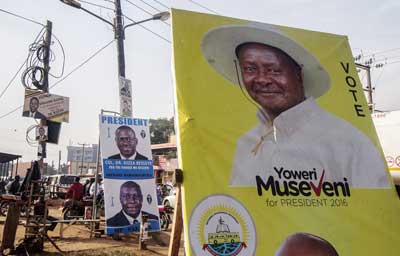Demonstrations against the government are a routine affair in the Ugandan capital Kampala, and Andrew Lwanga thought it would be just another day at work when he was assigned to cover a protest march by a few dozen unemployed youth on January 12, 2015.
He ended the day in a hospital bed, paralyzed from the waist down, after a senior police officer beat him for taking pictures of scuffles between the police and the demonstrators, an attack caught on camera. (According to news reports, the officer was arrested and charged with assault; the case is pending).
Lwanga, a reporter with the privately owned WBS TV, is one of dozens of journalists who have fallen victim to a campaign of harassment and intimidation by authorities in Uganda, where one of Africa’s longest-serving presidents, Yoweri Museveni, is bidding to extend his 30-year rule in elections due on February 18.
CPJ has documented a number of tactics the government has used to stifle media freedom, including arbitrary closure of stations which host opposition figures, threats to journalists seen as being critical of the ruling party, and physical assaults.
Campaigners say the authorities have deployed a broad arsenal of tools, some blunt and others more subtle, to create a media landscape going into the election which is heavily skewed in favour of President Museveni’s ruling party.
“They don’t always have to jail you or close you down,” said Haruna Kanaabi, executive secretary of the Independent Media Council, an association of media houses which seeks to offer a self-regulatory system for the Ugandan media.
“Instead, a few well-placed calls to senior editors at state-owned media houses and intense pressure on the proprietors of privately owned media have served to yield rampant self-censorship and created an environment of fear and uncertainty in newsrooms in addition as well to the more coercive measures,” Kanaabi told CPJ.
On the surface, Uganda has one of the more vibrant media environments in the region, with around 10 daily and weekly newspapers and dozens of radio stations.
But they operate in a setting where dissent is tolerated only up to a point, and attempts to highlight corruption among the authorities or present news that casts the government in negative light attracts swift sanction.
Robert Agenonga, 23, and a few other youth activists set up in 2011 the Lake Albert Youth Cabinet Media Project, a group which seeks to use social media and direct community engagement through village meetings to campaign for greater transparency in the exploitation of the significant oil deposits found in the area in 2006.
The young activists have faced consistent harassment from authorities.
On February 4, two campaigners, Sam Ozinda and Charles Adubango, were arrested at their homes a few days after holding a mini exhibition of cartoons in Nebbi district to highlight what they said was the loss of money donated by the Uganda Wildlife Authority for a fencing project for several schools in the area.
They were accused of defamation and spreading false information against a powerful national government official who hails from the region and released on bond.
Agenonga told CPJ the activists faced other forms of intimidation by authorities.
“Sometimes you have local council officials going around telling the people that we are foreign agents or spies because our work is supported by donors or sometimes they say we are gay, all in an effort to set the community against us,” he said. He said the team is still determined to continue shining a light on corruption among government officials.
International journalists have not been spared. On February 6, two BBC journalists were arrested at the Abim hospital in northern Uganda for filming “without authorization.”
The facility gained national attention following an earlier visit by opposition leader Kizza Besigye aimed at highlighting what he described as deplorable conditions there.
In an interview, Godfrey Mutabazi, executive director of the Uganda Communications Commission, a government media regulator, said the authorities were acting not to shield the incumbent from criticism, but to preserve the peace.
“We have laws which we must implement. We don’t want to go through a situation like Rwanda where hundreds of thousands died all in the name of freedom of expression.”
Asked how that squared with a pattern of crackdowns on media outlets seen as critical of the government and those that had hosted opposition figures, he said, “That’s not true. In any case, how do you know my affiliation? I might be a supporter of the opposition. I’m just implementing the law as it stands.”
More independent voices take a different view. A report by the African Centre for Media Excellence, a non-profit think-tank that runs training programs for journalists, found that the public Uganda Broadcasting Corporation (UBC), which by law is required to offer even-handed coverage of the candidates, allotted 78.9 per cent of its airtime to President Museveni in December, with the other candidates splitting the difference.
In the meantime, reports of beatings against journalists have continued to surface in an environment which Kanaabi, of the Independent Media Council, described as exceedingly hostile.
Bukedde TV reporter and cameraman Joseph Ssetimba, one of the journalists who were covering the January 12, 2015, demonstration with Lwanga when the police set upon them with kicks and blows, told CPJ that working in the media has turned into a kind of torture.
“It is sad what happened to us. I could not work for a month and, as I’m a freelancer, that meant I lost income and still had to pay my own hospital bills. The situation is very bad but it is much worse for Lwanga who needs treatment abroad and has not worked for a year. Moreover, because we pressed charges, the police see us as enemies and we live in fear. This is a very bad time.”
[Reporting from Kampala]
